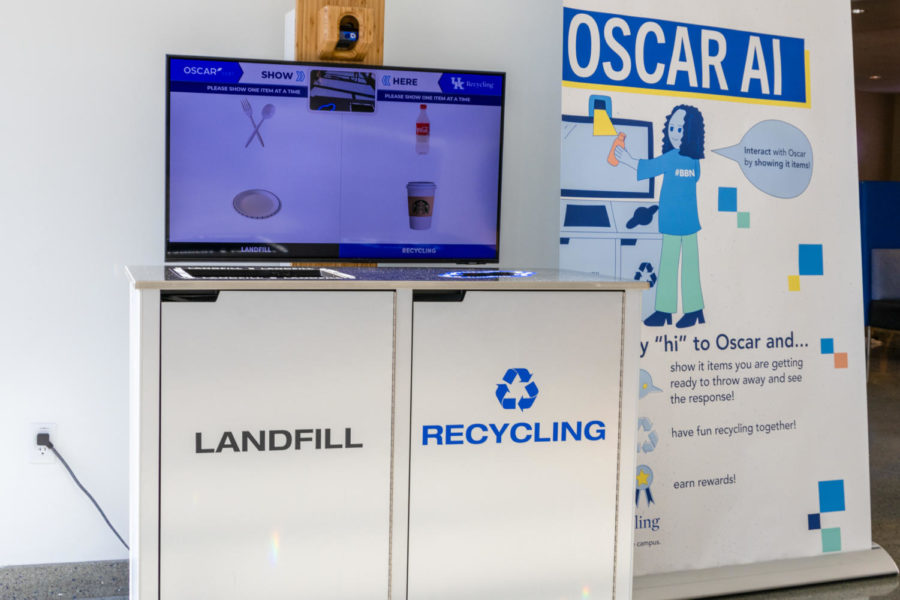Recycling on UK’s campus is becoming revolutionized
Oscar Sort, an artificial intelligence waste-sorting system from Intuitive AI, sits on Tuesday, April 11, 2023, at the Gatton Student Center in Lexington, Kentucky. Photo by Travis Fannon | Staff
April 12, 2023
“Oscar Sort” is a new AI technology that debuted on campus in early March and will hopefully help reach the goal of UK becoming a zero-waste campus by 2030.
With this new technology, individuals can more easily determine where to dispose of their trash by holding up the disposable item to a camera, which will then give a visual instruction via a connected TV screen to throw away or recycle the item.
Right now, there are two Oscar Sorts on campus: one in Gatton Student Center and another in The 90.
Though more will likely be installed to gain traction amongst students, having this technology available now will help to cut down on campus waste.
The main reason Oscar might encourage more people to recycle on campus is because it allows for greater understanding as to what can and cannot be recycled.
For example, I had always assumed that items like cardboard pizza boxes or used coffee cups could not be recycled because they were “contaminated” with food waste, but as recycling has become more sophisticated, these factors no longer matter (at least on UK’s campus — recycling streams are different everywhere).
Oscar Sort helps with these unknowns. It quickly and easily aids students, faculty and visitors on campus to make smarter decisions about waste to help UK and the Lexington community become greener and less wasteful.
Part of this expanded list of recyclable materials is because of UK’s partnership with WestRock, a company with a recycling facility that allows recycled materials to be sorted into categories like paper, cardboard, aluminum, steel, glass and different plastic types to make new recycled products more effectively.
The EPA has estimated that upwards of 75% of waste thrown away by Americans could be recycled, but only about 30% ends up being recycled.
This discrepancy makes it all the more important for technology and education about waste reduction to be more widely spread.
In addition to the technology, UK Recycling has also added informational sheets onto non-AI recycling bins to encourage smarter waste choices in other parts of campus.
They have also led initiatives like “Campus Race to Zero Waste,” which resulted in UK recycling 190,140 pounds of waste and composting 21,716 pounds of waste.
All of these efforts have helped UK become a leader in waste management and recycling in the Lexington community and beyond, but there is still much work to be done.
Expanding the use of the Oscar Sort AI technology will greatly help spread knowledge about recycling on campus and hopefully allow students and faculty alike to change their own waste and consumption habits beyond life on campus.




























































































































































